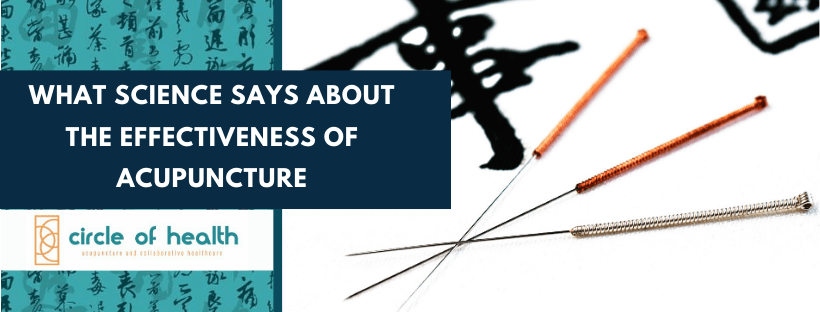What Is Acupuncture?
Acupuncture is a technique in which practitioners stimulate specific points on the body—most often by inserting thin needles through the skin. It is one of the practices used in traditional Chinese medicine.
What the Science Says About the Effectiveness of Acupuncture
Results from a number of studies suggest that acupuncture may help ease types of pain that are often chronic such as low-back pain, neck pain, and osteoarthritis/knee pain. It also may help reduce the frequency of tension headaches and prevent migraine headaches. Therefore, acupuncture appears to be a reasonable option for people with chronic pain to consider. However, clinical practice guidelines are inconsistent in recommendations about acupuncture.
The effects of acupuncture on the brain and body and how best to measure them are only beginning to be understood. Current evidence suggests that many factors—like expectation and belief—that are unrelated to acupuncture needling may play important roles in the beneficial effects of acupuncture on pain.
Read more about acupuncture for these pain conditions and others:
For Low-Back Pain
• A 2012 analysis of data on participants in acupuncture studies looked at back and neck pain together and found that actual acupuncture was more helpful than either no acupuncture or simulated acupuncture.
• A 2010 review by the Agency for Healthcare Research and Quality found that acupuncture relieved low-back pain immediately after treatment but not over longer periods of time.
• A 2008 systematic review of studies on acupuncture for low-back pain found strong evidence that combining acupuncture with usual care helps more than usual care alone. The same review also found strong evidence that there is no difference between the effects of actual and simulated acupuncture in people with low-back pain.
• Clinical practice guidelines issued by the American Pain Society and the American College of Physicians in 2007 recommend acupuncture as one of several nondrug approaches physicians should consider when patients with chronic low-back pain do not respond to self-care (practices that people can do by themselves, such as remaining active, applying heat, and taking pain-relieving medications).
For Neck Pain
• A 2009 analysis found that actual acupuncture was more helpful for neck pain than simulated acupuncture, but the analysis was based on a small amount of evidence (only three studies with small study populations).
• A large German study with more than 14,000 participants evaluated adding acupuncture to usual care for neck pain. The researchers found that participants reported greater pain relief than those who didn’t receive it; the researchers didn’t test actual acupuncture against simulated acupuncture.
For Osteoarthritis/Knee Pain
• A 2014 Australian clinical study involving 282 men and women showed that needle and laser acupuncture were modestly better at relieving knee pain from osteoarthritis than no treatment, but not better than simulated (sham) laser acupuncture. Participants received 8 to 12 actual and simulated acupuncture treatments over 12 weeks. These results are generally consistent with previous studies, which showed that acupuncture is consistently better than no treatment but not necessarily better than simulated acupuncture at relieving osteoarthritis pain.
• A major 2012 analysis of data on participants in acupuncture studies found that actual acupuncture was more helpful for osteoarthritis pain than simulated acupuncture or no acupuncture.
• A 2010 systematic review of studies of acupuncture for knee or hip osteoarthritis concluded that actual acupuncture was more helpful for osteoarthritis pain than either simulated acupuncture or no acupuncture. However, the difference between actual and simulated acupuncture was very small, while the difference between acupuncture and no acupuncture was large.
For Headache
• A 2012 analysis of data on individual participants in acupuncture studies looked at migraine and tension headaches. The analysis showed that actual acupuncture was more effective than either no acupuncture or simulated acupuncture in reducing headache frequency or severity.
• A 2009 systematic review of studies concluded that actual acupuncture, compared with simulated acupuncture or pain-relieving drugs, helped people with tension-type headaches. A 2008 systematic review of studies suggested that actual acupuncture has a very slight advantage over simulated acupuncture in reducing tension-type headache intensity and the number of headache days per month.
• A 2009 systematic review found that adding acupuncture to basic care for migraines helped to reduce migraine frequency. However, in studies that compared actual acupuncture with simulated acupuncture, researchers found that the differences between the two treatments may have been due to chance.
For Other Conditions
• Results of a systematic review that combined data from 11 clinical trials with more than 1,200 participants suggested that acupuncture (and acupuncture point stimulation) may help with certain symptoms associated with cancer treatments.
• There is not enough evidence to determine if acupuncture can help people with depression.
• Acupuncture has been promoted as a smoking cessation treatment since the 1970s, but research has not shown that it helps people quit the habit.
What Is Simulated Acupuncture?
In some clinical trials, researchers test a product or practice against an inactive product or technique (called a placebo) to see if the response is due to the test protocol or to something else. Many acupuncture trials rely on a technique called simulated acupuncture, which may use blunt-tipped retractable needles that touch the skin but do not penetrate (in real acupuncture, needles penetrate the skin). Researchers also may simulate acupuncture in other ways. However, in some instances, researchers have observed that simulated acupuncture resulted in some degree of pain relief.
What the Science Says About Safety and Side Effects of Acupuncture
• Relatively few complications from using acupuncture have been reported. Still, complications have resulted from use of nonsterile needles and improper delivery of treatments.
• When not delivered properly, acupuncture can cause serious adverse effects, including infections, punctured organs, collapsed lungs, and injury to the central nervous system.
What’s the Bottom Line?
How much do we know about acupuncture?
There have been extensive studies conducted on acupuncture, especially for back and neck pain, osteoarthritis/knee pain, and headache. However, researchers are only beginning to understand whether acupuncture can be helpful for various health conditions.
What do we know about the effectiveness of acupuncture?
Research suggests that acupuncture can help manage certain pain conditions, but evidence about its value for other health issues is uncertain.
What do we know about the safety of acupuncture?
Acupuncture is generally considered safe when performed by an experienced, well-trained practitioner using sterile needles. Improperly performed acupuncture can cause serious side effects.
Article Source: https://www.nccih.nih.gov/health/acupuncture-in-depth
Learn More About Acupuncture
Visit: https://circleofhealthlongmont.com/therapy/acupuncture.php
Schedule Your Acupuncture Appointment Online: https://circleofhealthlongmont.as.me

Garth Reynolds, MSTCM, L.Ac.
Licensed Acupuncturist and Clinical Herbalist | Schedule Your Appointment
Martial Arts Instructors with Bagua Internal Arts | Local & Online Classes Weekly
#Acupuncture #AcupunctureBenefits #AcupunctureNear Me #ChineseMedicine #TraditionalChineseMedicine #TCM #TCMBenefits #TCMNearMe


